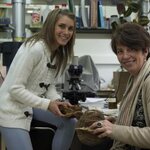Science Education & Policy

When I walk in a seminar or lecture room, it looks mostly as 30 or 40 years ago. Then lifting my eyes I would notice that the "data"-projector is still there hanging from the ceiling, in addition to the overhead projector covered by chalk dust in the corner. The rooms are still dominated by various green- black- or sometimes white- boards, in most cases serving as source of kilograms of chalk dust per decade - or more - I did not measure, but that seems reaosonable, some 200 g per year. But that is not the main point now. My point is what happened with all the "smart" boards, interactive…

We're in a hyper-regulated society. Everyone wants to regulate other people while they claim to care about freedom and choice. If you claim to care about freedom and then want to ban marriage or IVF or food or medicine, I know how you vote.
As a hallmark of its presidency, the White House advocated and got passed the Affordable Care Act, which friend and foe alike call Obamacare.
Why would mandatory health insurance also include a provision for food labeling? Maybe it's for the kids. But mandatory labeling is in there and President Obama's FDA says first-year compliance will cost businesses $…

I wrote before about the controversy involving the release earlier this year of a genome sequence of the HeLa cell line, which was taken without consent from Henrietta Lacks as she lay dying of ovarian cancer in 1950s Baltimore.
Now, the NIH has announced an agreement with Lacks’ descendants to obtain their consent for access to and use of the HeLa genome (the agreement applies only to NIH funded research, but the hope is that others will agree to it as well).
I think the NIH handled this reasonably well. There’s no way to go back and consent Henrietta Lacks, so one could reasonably argue…

How do you demonize scientists who added 3 genes to the 30,000 in rice in order to stop vitamin A deficiencies in poor countries with rice-dominated diets? There are zero pitfalls to it yet an elaborate, well-funded marketing campaign has been leveled against it.
Ingo Potrykus and Peter Beyer genetically engineered their Golden Rice, called that because the genes they used for producing beta carotene, a Vitamin A precursor, gave the rice grains a 'golden' color, and even persuaded companies to waive patent rights so that they could give the seeds away for free. No 'Monsanto is evil'…

There are two ways to influence the public - basically carrots and sticks. A stick is, of course, taxes and fees and regulations and armed federal agents at your house should you choose not to obey the law.
A carrot is to create a Behavioral Insights project, similar to one that exists in the United Kingdom, tasked with using the awesome power of social science to create the behavior they want - it's like framing on steroids.
Obviously everyone uses behavioral data - applied marketing is terrifically successfully and is the one aspect of psychology we know really works. But corporations…

Though Oregon voters gave a thumbs down to a 2010 ballot measure to create state-certified marijuana dispensaries, the Legislature bucked that tyranny of the majority and made them legal this month.
Now the real work starts: how to certify them.
Nothing says fun for competing advocacy groups like broad, vaguely-worded legislation and House Bill 3460 is perfect in that it "directs [the] Oregon Health Authority to establish a registration system for medical marijuana facilities" and not much else. Well, it also says not to use federal funds or lottery money to finance them, and something…

Taxes reduce consumption and usage of the products being targeted, it is just often the case that it isn't reducing consumption among the people being targeted.
As a way to spur consumption of 'healthier' eating, societal food advocates have sought to tax sugary drinks. A paper by RTI International, Duke University and the U.S. Department of Agriculture instead finds that heavier taxes on sodas and juices is simply creating a government subsidy for other unhealthy foods - the reduction in sugary beverages due to a soda tax would likely lead consumers to substitute those calories by…

There's still no free lunch. Finite budgets based on taxes that give equal treatment to everyone aren't really resulting in equal quality. Instead, most ward nurses in NHS hospitals say they are forced to ration care, or not complete certain aspects of it — including adequate monitoring of patients — because they don't have enough time, indicates a new paper.
The lower the nurse headcount, the greater the risk, the results of a survey show, prompting the researchers to suggest that hospitals could use episodes of missed care as an early warning sign that nurse staffing levels are too low to…

In California, there are runaway wildfires because no one is allowed to take a machine into the woods and clear dead trees. Other countries have the opposite problem; a shortage of dead wood in forests results because fallen branches and trees are cleared away too often.
Our one-size-fits-all federal management policy often hurts the environment under the guise of trying to help. Biologists working in Navarre note that dead wood ought to be decomposing, as it is the habitat of many living beings like lignicolous fungi. These fungi are capable of decomposing dead wood and turning it into…

I've long said that energy is the biggest issue we face in the 21st century - with energy, I can solve the problems of food and water and that helps solve poverty too. I can even turn lead into gold.
Global warming gets all the attention in crisis thinking today but at its heart that is an energy issue too - when anti-science activists in America forced viable alternative energy out of America, it put us firmly on the path of rampant coal usage and higher greenhouse gas emissions. Then they recognized the perils of coal emissions that were used in place of nuclear power and that solar was…